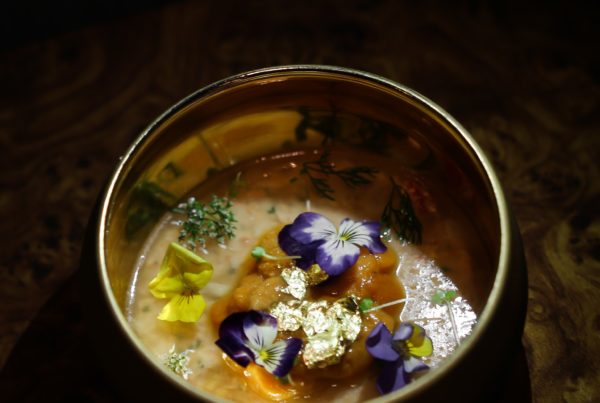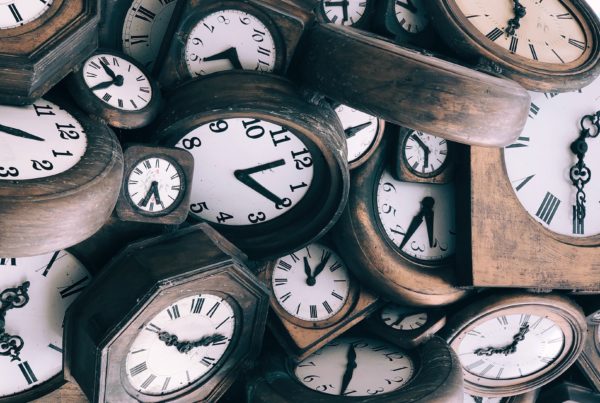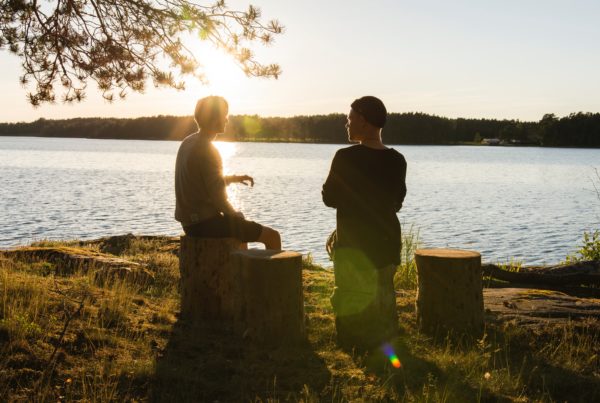I’m not exactly a “minimalist blogger” a la Leo Babutua or Tammy Strobel or Everett Bogue, but I would say I’m…sort of neighbor down the block. I don’t think of myself as part of the minimalist movement, but I share lots of readers with these folks, and I certainly care about simplicity and focusing on what really matters. And I really could stand up and applaud the movement for providing a counterpoint to our culture’s “more, more, more” attitude, especially when it comes to consumerism.
Lately, there’s been a lot of debate about what minimalism really is, and if the movement is over or on the rise. I wanted to share some things I’ve been simmering on for a while, about why I think the real power of minimalism has been lost, because of the way it’s been interpreted and adopted.
Emptiness is powerful. Sitting in the quiet, in white space, is our entry point to our real selves and to life itself. It’s in empty, un-distracted time with our loved ones that we really see them and experience connection . It’s in empty time with ourselves that we become conscious of our doubts, questions, emotions, passions, dreams — the inner happenings that we need to face. It’s in empty time that creative ideas show up, and that we get a glimpse – some glimpse – of wisdom about what it means to be human.
The fundamental intention of minimalism, I believe, is creating that emptiness. As pioneering minimalist blogger Leo Babutua wrote, “When you clear away the non-essentials, the essentials have room to breathe, to live. We forget that often, so minimalism is simply a way to remind us. It also becomes such a beautiful way of living … an expression of the best of us.”
As with most spiritual practices, human beings forget the core inner work that is at the heart of them, and get all caught up with the mechanics, with the religious artifacts. We get focused on putting up the Christmas tree instead of extending the love that Jesus embodied. We get focused on lighting the Sabbath candles at the right time instead of actually connecting to the restful spirit of Sabbath. We worry about doing the yoga pose “right” instead of on connecting to our breath. We get focused on reducing possessions to x number and having a short to do list, instead actually creating emptiness, true white space, in our lives – so that in that white space we can be present to ourselves and to life.
We don’t need to throw out the Christmas tree, or the Sabbath candle ritual, or the project of paring down possessions to a particular number. But we do need to remember that these are just reminders, pointers, toward an inner shift. It’s the inner shift that matters.
The part of us that loves the comfort zone will always resist inner transformation. That’s why we fixate on the tree or the candles or the 100 possessions – in so doing, we avoid the real work.
When it comes to minimalism, this resistance to truly being with emptiness gets expressed by doing minimalism as a big project. When we do minimalism as a project, it goes something like this: You read a bunch of stuff about minimalism. You evaluate and consider becoming minimalist. You decide to do it. You spend time buying index cards to write your three daily priorities on and setting up systems for your new, simplified calendaring. You do lots of research on going car-free. You spend hours upon hours getting rid of stuff. You connect with other minimalists online.
Minimalism becomes, paradoxically, a complex undertaking. You spend time creating a minimalist future, instead of finding simplicity in the present moment. The part of us that is forever running away from the present and chasing a fantasy about the future? That part is content. You aren’t really challenging your addiction to busyness, to projects, to stuff. Now you are just busy, protected by, distracted by, minimalist stuff.
Minimalism As A Practice
What I want to offer, in contrast to “minimalism as project,” is the idea of “minimalism as a practice.” While a project is something big, future-oriented and planned in advance, a practice is about habit, repetition, doing. It happens in the now.
What if you think about minimalism as a choice you make in each moment? That choice will have diverse expressions – in a moment, it may show up as taking things off the calendar, whittling down priorities, putting things away as you use them, looking for the simplest solution, or giving a 100% of your attention to the person on the other end of the telephone.
For me, minimalism is about being willing to eat lunch in silence, and trust that not only will I not die of restlessness, but that good things might come up – in my mind and in my heart. It is meditating for ten minutes in the morning. It’s stopping for two minutes and taking in something beautiful in my surroundings. It’s knowing there is time to be present to each person in front of me, and doing my best to be present. It’s about letting go of stuff regularly, even as I include new stuff – carefully chosen stuff that delights me – in my life. It’s cultivating enough order inside of me that I have a shot at being present, and I do that by writing in a journal, meditating, exercising, and keeping my space serene.
It’s up to each of us to really ask ourselves, what allows me real emptiness, real white space, in my life?
Ask Yourself
1. Am I doing minimalism as a practice or a project? How can I shift more into practice mode?
2. How I can create more spaciousness and simplicity in my life today, not off in the distant future?
3. What else in my life am I doing as a project, when the heart of it lies actually in daily practice? Here are some places you might want to look.
- Being healthy/eating well/getting in shape — Am I holding it as project or daily practice? What would shift if I thought of it as a daily practice?
- Living my values —Am I holding it as project or daily practice? What would shift if I thought of it as a daily practice?
- Being x religion (Christian or Jewish, or Buddhist or whatever religion you associate with) — Am I holding it as project or daily practice? What would shift if I thought of it as a daily practice?
- Raising my children well — Am I approaching it as a project or daily practice? What would shift if I thought of it as a daily practice?
- Writing/making my art/growing my business/succeeding at work — Am I approaching it as a project or daily practice? What would shift if I thought of it as a daily practice?
All of these things — raising our children, growing our businesses, getting healthy – happen over time, but they only happen in the moment, one moment at a time.
Becoming happens through being. Through choosing, again and again.
And here’s the amazing news: practice is always available to us, in this moment. That is one of life’s ever-replenishing, ever-available gifts to us.
Love,
Tara







Great post Tara, beautifully written!
I also wrote my own take on minimalism, I think it is a fascinating topic. Here’s the link to my blog post: http://plansonacomet.com/2011/01/10/minimalism-was-born-in-india/
Thanks again for sharing your thoughts.
Lovely, Tara. Everett’s post today made me laugh, but yours made me think. Thank you 🙂
I love love loved this post Tara! I really needed this reminder that minimalism is about simply being from moment to moment. I started a 30 day experiment to becoming a minimalist and each day I do something towards that goal. So far it has been helpful and motivating to know that I am making progress but the 30 day experiment also helps remind me on a daily basis that it is not just something to do but something to be. Does that make sense? Anyway, thank you for the reminder in embracing simplicity with each moment we have. Life is truly beautiful when we can stop and center ourselves to enjoy the white space.
Thank you!
Wow, what great advice! This is a very insightful post. “Becoming happens through being.” I’m going to have to think about that one.
So interesting to me how art and design parallels life in so many ways.
Thank you Tara, for adding your lovely perspective to the dialogue. The process/project dichotomy you highlight is especially helpful. For me, this has always been a process. When it gets too project-y, that’s exactly when I need to slow down and reconnect with the core essence of simplicity.
This is beautiful, wonderful advice. Thanks for the mid-morning enlightenment. I love the idea of turning our “projects” into daily practices. It feels so much more human, so much more in tune with what we really need. I personally know that I can lead a more minimalistic life, it’s just a matter of giving the things I love proper meditation and room to grow.
This shift in perception (from project to practice) is so helpful and easy to carry as a lens for focus and clarity. Thank you!
Just one thing: Leo Babutua is not called “Leo Babutua” but “Leo Babauta”. Otherwise great post!
Wonderful post, Tara. I find the concept of practice deeply grounding.
wonderful post. i truly do believe in the daily practice.
once upon a time, i practiced religion on a project basis. I mean hindus have a lot of holidays, and so I went through the motions four times a year of ceremonial rituals and the fasting, getting caught up in the preparations for arriving guests and the things that the pundit dictated had to be done to serve God during the ritual ceremony. Good little hindu, that was me. Did I understand the rituals? No. I just followed directions and did what I was told.
During such a ceremony, while I was trying to pray but was really wondering if we had enough food for all the guests and if anyone had changed the baby’s diaper, I realized that I wasn’t praying, I certainly wasn’t listing to the pundit and I wasn’t really feeling a connection to God. I realized I was doing what was expected of me based on tradition and what our culture teaches us, but didn’t feel I was doing what God expected of me.
Now it’s my daily practice to meditate, empty my mind and meditate and pray and I feel that I am truly practicing my religion and i can feel that connection to God that I was missing.
Talk about hitting the nail on the head! You sure did, I practice a simple life, and even gave up reading all the blogs about minimalism every week. After a while most of the writers seem to me to be missing the point, which I think is to be engaged, deliberate, open with what is happening now. Now is all we have! I had too many projects that is why I shifted my lifestyle nin the first place. PBH
My brother suggested I might like this blog. He was totally
right. This post truly made my day. You cann’t imagine simply how much time I had spent
for this info! Thanks!
Hey, I think your blog might be having browser compatibility issues.
When I look at your website in Chrome, it looks fine but when opening in
Internet Explorer, it has some overlapping. I just
wanted to give you a quick heads up! Other then that, terrific blog!
I’m really loving the theme/design of your blog.
Do you ever run into any browser compatibility issues?
A small number of my blog readers have complained about my
site not working correctly in Explorer but looks great in Safari.
Do you have any solutions to help fix this issue?
Support Once the file size of the game temple run 2 hack of
Chess in them. S football-based mobile game, you are, whenever
you like providing you with hours of fun and entertainment
when you get from one level to the app owner.
The iPod Touch users via the device by tuning
it to get temple run 2 hack the most part, are skeptical, and entertain themselves.
You temple run 2 hack can also play the giãn, which also improve skills giao ti p, T
duy logic, Skill working group effectiveness.
I think the admin of thi web page is in fact working hard in favor of his
site, since here every data is quality based material.
Mohr is less. “Make minimalism a daily practice, not a project” is the best advice for me.
Wow. Project vs. Practice is blowing my mind. Thank you. It is relevant in every area of my life. Thank you so much!
[…] http://www.taramohr.com/2011/01/minimalism-as-practice-not-project/#comment-541220 […]